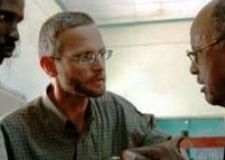US warns media over travel to Darfur
Aug 31, 2006 (WASHINGTON) — Following the arrest for espionage of a high profile US journalist in Sudan’s troubled Darfur region, the State Department warned media against trying to visit the area without Khartoum’s permission.
 An updated travel warning for Sudan reminded US citizens of the “continued threat of terrorism in Sudan” and stressed the need to obtain proper travel documents before attempting to enter the country.
An updated travel warning for Sudan reminded US citizens of the “continued threat of terrorism in Sudan” and stressed the need to obtain proper travel documents before attempting to enter the country.
“The Sudanese government requires that anyone seeking to enter the Darfur area, or to take photographs or perform other journalistic functions anywhere in Sudan, must obtain a special permit,” the department said.
“This includes journalists, photographers, and other press/media employees,” it said.
Darfur, a region the size of France, has been embroiled in violence since a rebellion by ethnic minorities seeking autonomy erupted in 2003, sparking a wave of repression by government-backed Islamic militia that has left up to 300,000 dead and forced 2.5 million people from their homes.
The UN Security Council approved Thursday the deployment of a large UN peacekeeping force in Darfur, where US officials warned the government and rebel groups were preparing for a new round fighting.
The State Department said five foreigners, including two US nationals, were arrested in August after entering Darfur from neighboring Chad without appropriate documentation.
In the most high-profile case, Pulitzer Prize-winning journalist Paul Salopek was arrested on August 6 with two Chadian escorts while on assignment for National Geographic magazine.
He was charged by a local court on Saturday with criminal espionage, reporting false information and entering Sudan without a visa, and could face years in prison if convicted.
US assistant secretary of state for African affairs, Jendayi Frazer, raised Salopek’s case with Sudanese President Omar al-Beshir and other senior officials during a visit to Khartoum at the weekend.
She told reporters Thursday that Beshir and Foreign Minister Lam Akol had given her some assurances that they would look into Salopek’s case.
(ST/AFP)
